Unit 3 A day out Reading 2 课件 (共35张PPT)
文档属性
| 名称 | Unit 3 A day out Reading 2 课件 (共35张PPT) |

|
|
| 格式 | zip | ||
| 文件大小 | 653.0KB | ||
| 资源类型 | 教案 | ||
| 版本资源 | 牛津译林版 | ||
| 科目 | 英语 | ||
| 更新时间 | 2018-11-16 00:00:00 | ||
图片预览

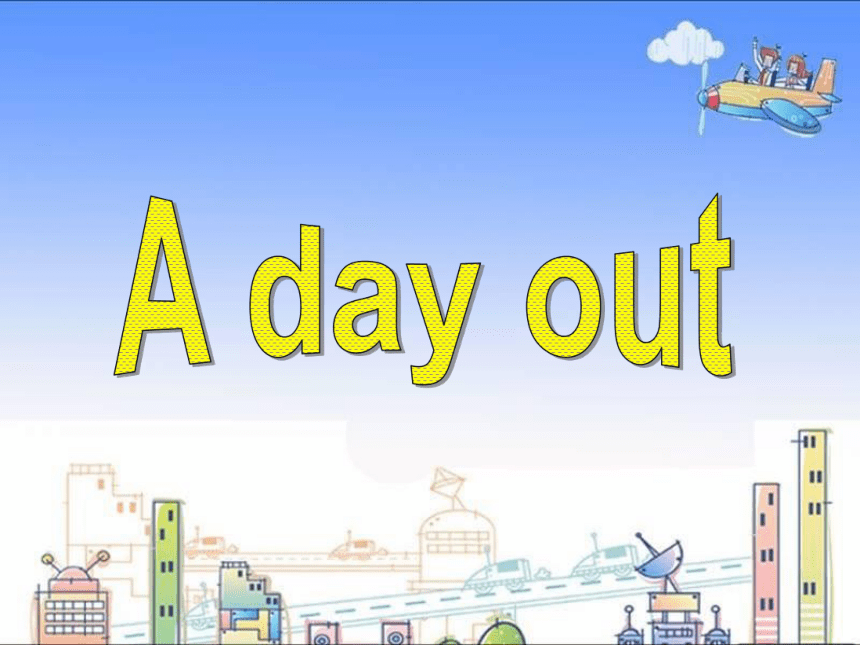

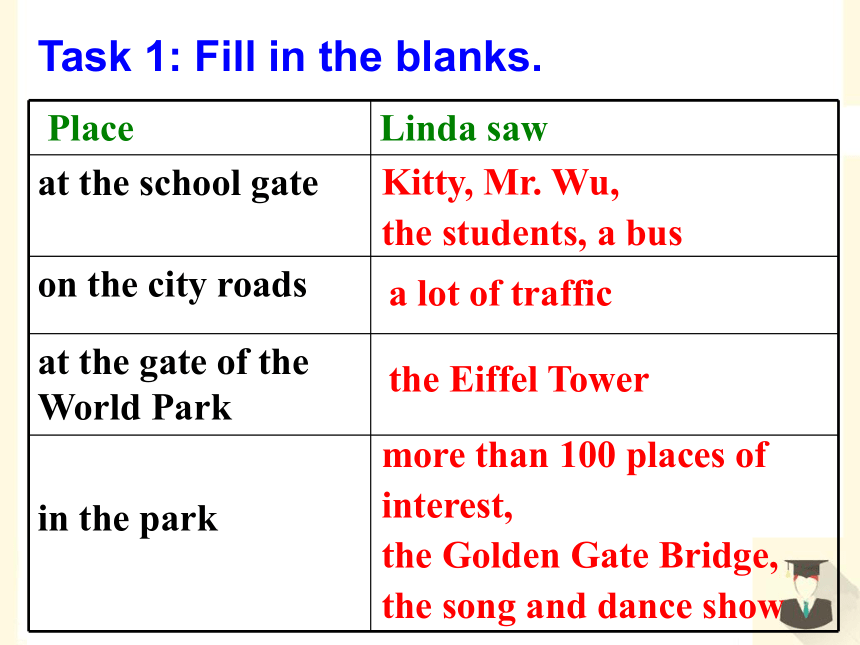
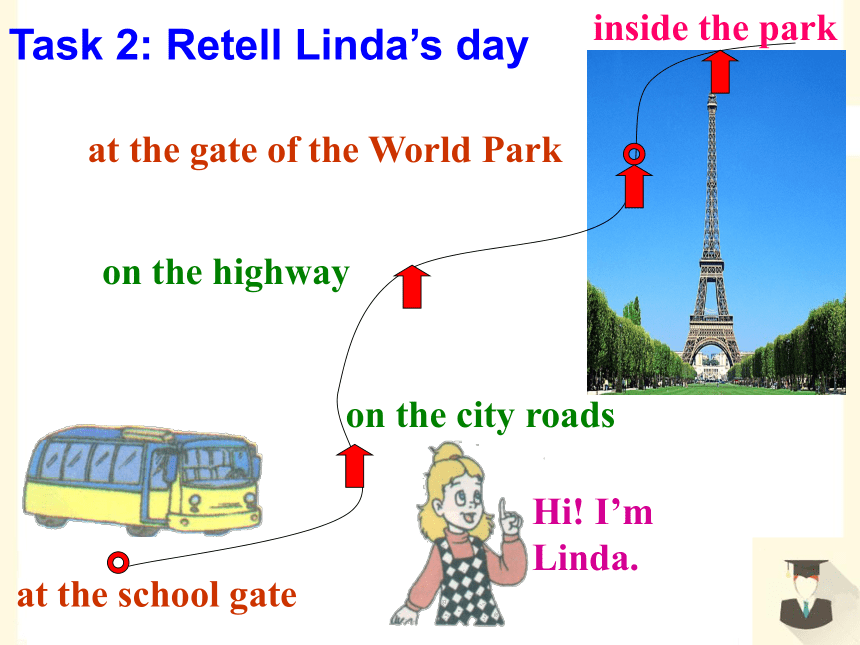
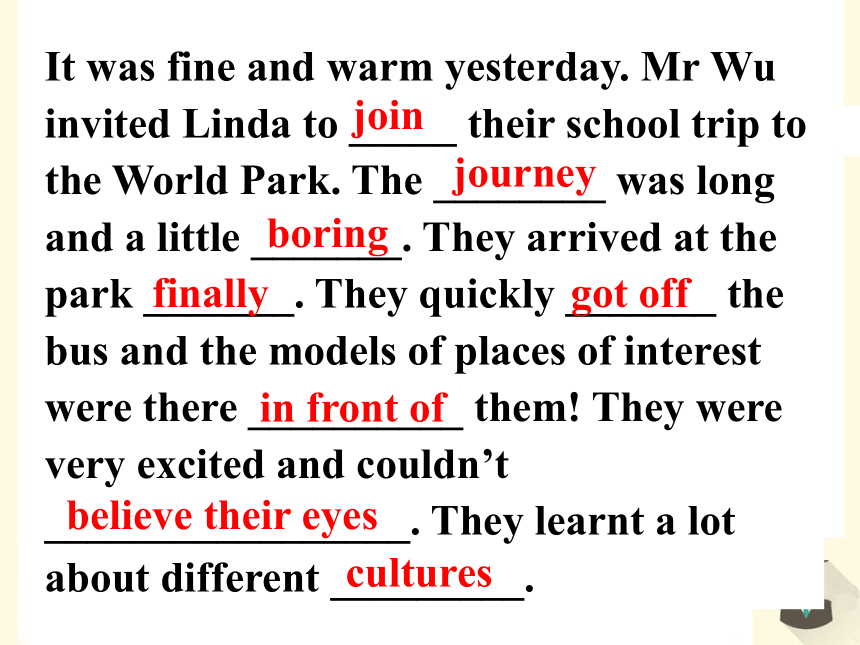
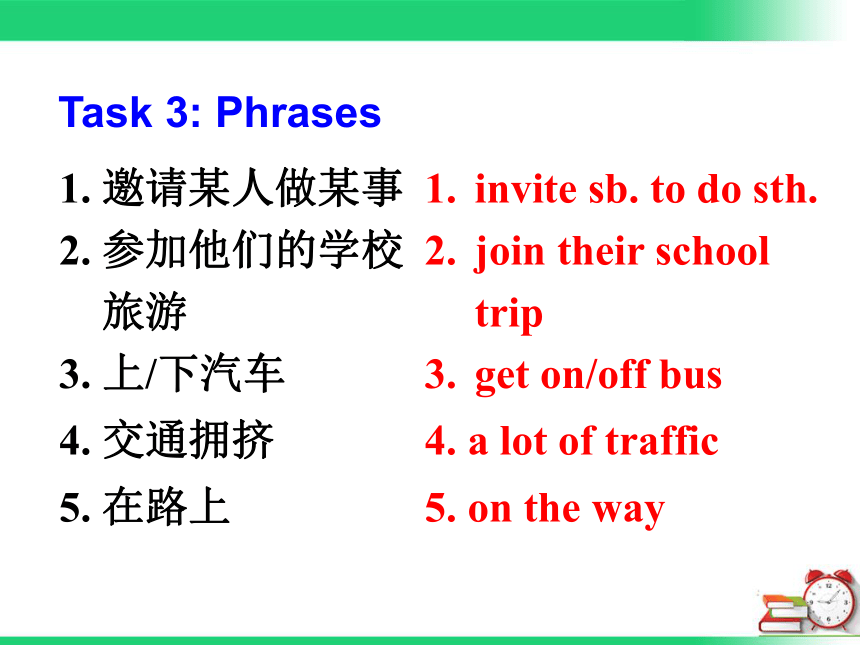
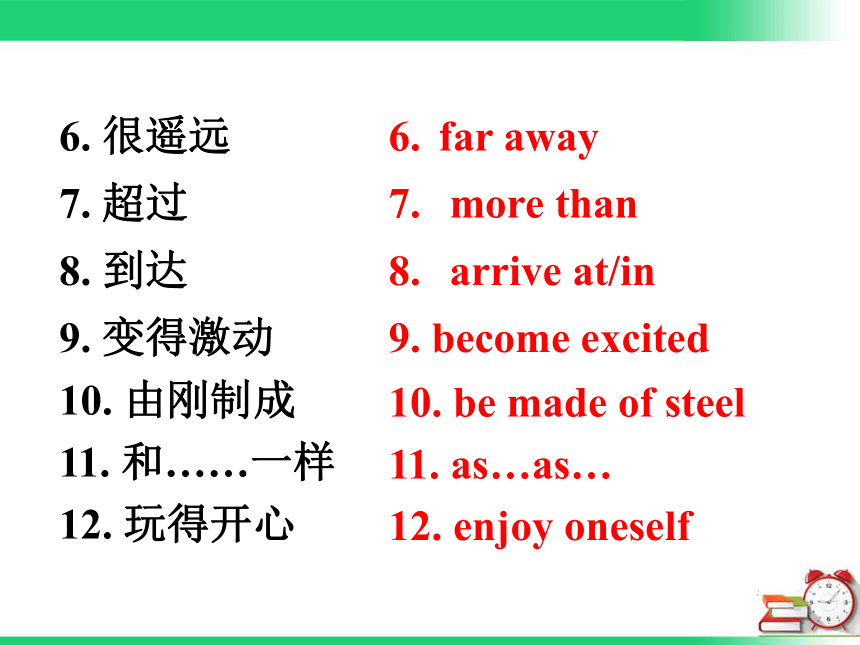
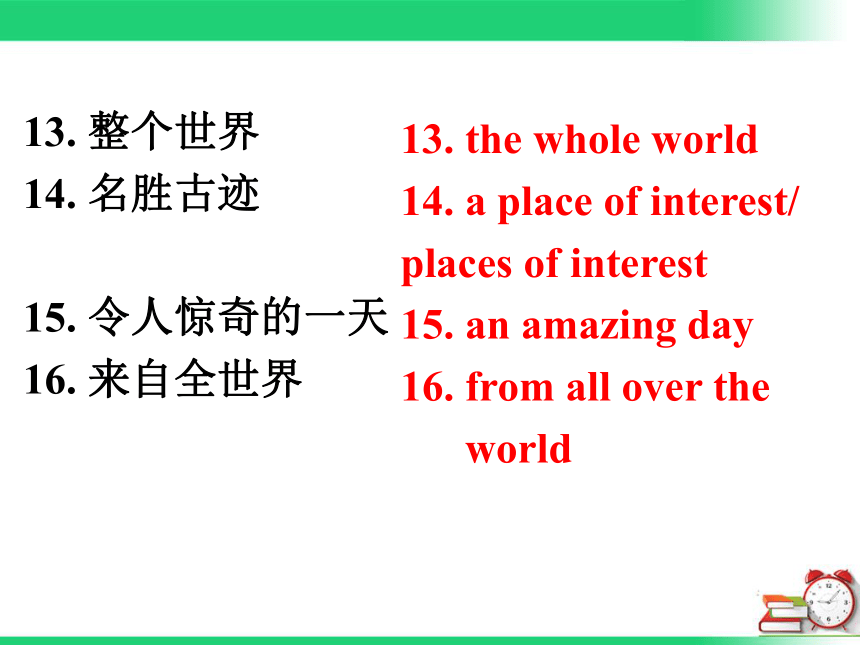

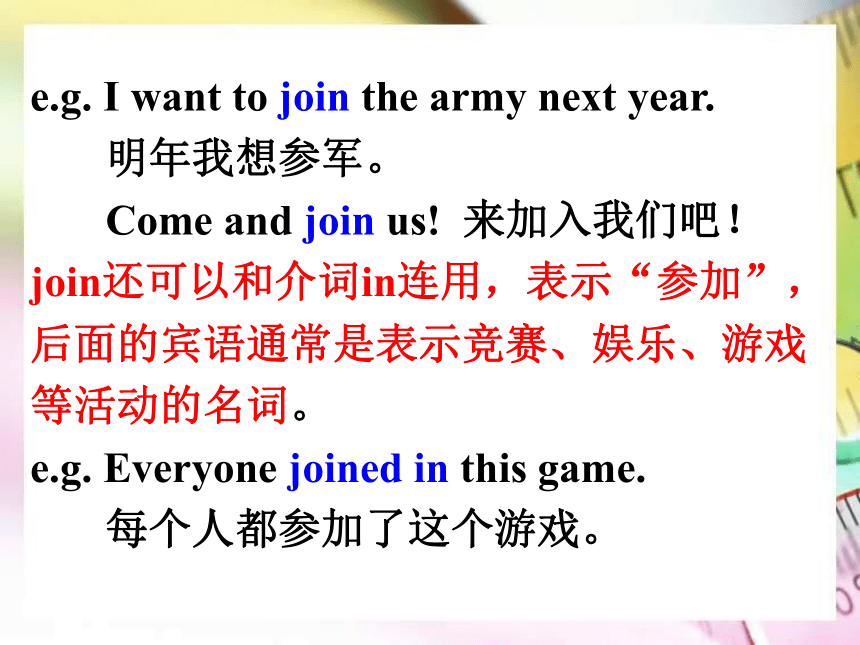
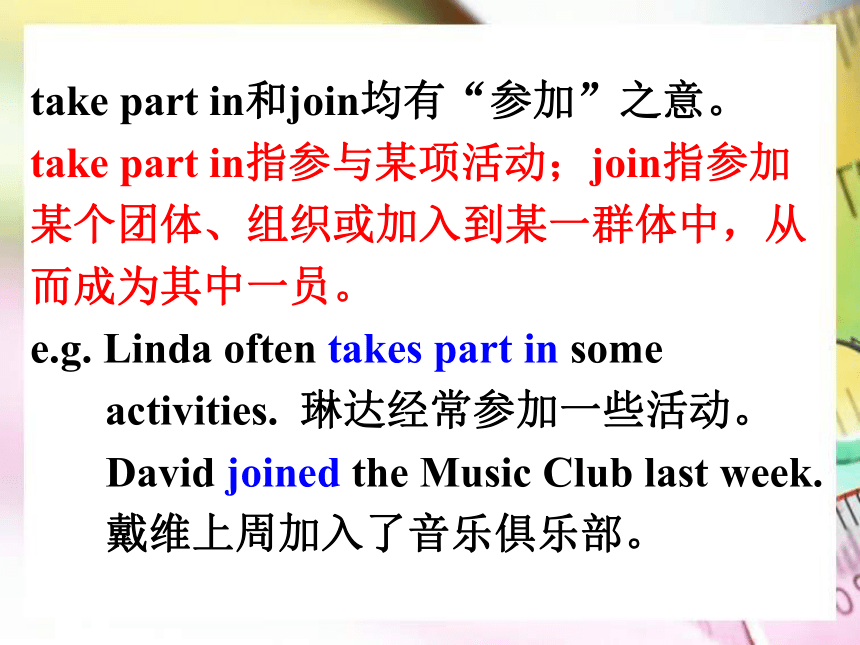
文档简介
课件35张PPT。Unit 3A day outReading 2Task 1: Fill in the blanks.a lot of trafficthe Eiffel TowerKitty, Mr. Wu,
the students, a busmore than 100 places of interest,
the Golden Gate Bridge,
the song and dance showHi! I’m Linda.at the school gateon the city roadson the highway at the gate of the World Parkinside the parkTask 2: Retell Linda’s day It was fine and warm yesterday. Mr Wu invited Linda to _____ their school trip to the World Park. The ________ was long and a little _______. They arrived at the park _______. They quickly _______ the bus and the models of places of interest were there __________ them! They were very excited and couldn’t _________________. They learnt a lot about different _________.joinjourneyboringfinallygot offin front ofbelieve their eyesculturesTask 3: Phrases1. 邀请某人做某事
2. 参加他们的学校
旅游
3. 上/下汽车
4. 交通拥挤
5. 在路上invite sb. to do sth.
join their school trip
get on/off bus
4. a lot of traffic
5. on the way6. 很遥远
7. 超过
8. 到达
9. 变得激动
10. 由刚制成
11. 和……一样
12. 玩得开心far away
more than
arrive at/in
9. become excited
10. be made of steel
11. as…as…
12. enjoy oneself13. 整个世界
14. 名胜古迹
15. 令人惊奇的一天
16. 来自全世界
13. the whole world
14. a place of interest/ places of interest
15. an amazing day
16. from all over the
world1. Yesterday Kitty’s teacher Mr Wu invited me to join their school trip to the World Park.
join是及物动词,意为“参加,加入”。后接某个组织或某个群体的名称时指“加入某个组织、参加到某人群中”,成为其中的一员。Language pointse.g. I want to join the army next year.
明年我想参军。
Come and join us!? 来加入我们吧!
join还可以和介词in连用,表示“参加”,后面的宾语通常是表示竞赛、娱乐、游戏等活动的名词。
e.g. Everyone joined in this game.
每个人都参加了这个游戏。take part in和join均有“参加”之意。
take part in指参与某项活动;join指参加某个团体、组织或加入到某一群体中,从而成为其中一员。
e.g. Linda often takes part in some
activities. 琳达经常参加一些活动。
David joined the Music Club last week.
戴维上周加入了音乐俱乐部。根据句意选用take part in或join填空。
1. About 200 people will _____________ the game.
2. I want to ________ the school football team.
3. Betty and Lucy are making a model plane. Let’s go and ________ them.take part in?join?? join??2. I’m doing fine here.
fine adv. 够好,挺不错 常用于口语中
e.g. Things are going fine.
事事顺利。3. We finally arrived at the park.
finally = at last /in the end 可以放在句
首,也可以放在句末 。
e.g. ____________, we won the basketball
match.
最后,我们终于赢得这场篮球赛。Finally/At last arrive vi. 到达
arrive后接表示地点的名词时,要与介词in
或at连用。
e.g. What time does the plane arrive in Paris?
飞机几点到巴黎?
They will arrive at the bus stop at 7:00 this afternoon.
他们今天下午七点到车站。arrive后接表示地点的副词时,则不需要用介词。
e.g. She often arrives home at 7:30 in the
evening.
她经常晚上七点半到家。根据汉语意思完成英语句子。
(1) 她昨天晚上九点到家。
She _____________ at 9:00 last night.
(2) 她每天大约七点四十五到校。
She ____________ school at about
7:45 every day.
(3) 你们将何时到上海?
When will you ___________ Shanghai? arrived home??arrives at?arrive in get, arrive和reach都可以表示“到达”
get是不及物动词,其后若跟地点名词,需要借助于介词to
e.g. Please write to me when you get to
England.
你到了英国请给我写信。arrive也是不及物动词,其后若跟地点名词,需要借助于介词in或at (arrive in后跟相对较大的地方,arrive at后跟相对较小的地方);
e.g. My father arrived in France at eight
o’clock in the morning.
我爸爸早上八点就到了法国了。
The train arrived at the station in the
morning. 火车早上就到车站了。reach是及物动词,其后可以直接跟宾语。
e.g. When will you reach there?
你什么时候能到那?
当get, arrive后面接here, there, home等表示地点的副词时,应省略介词。
e.g. We got / arrived here last night.
我们昨晚到的。请根据句意选用reach, get或 arrive填空有的需要变换形式。
1. We will _____ Beijing this afternoon.
2. David _____ to London last week.
3. Yesterday the man _______ at the
airport on time.
4. We _____________________ here at five
o’clock yesterday.reach?got??arrived?reached / arrived / got4. All of us couldn’t wait to get off the bus.
can’t wait 迫不及待,后面可接动词不定式或“介词+宾语”结构。
e.g. I can’t wait to go on holiday with
my family.
我迫不及待地想要和家人去度假。
get off 下车
e.g. He’ll tell you to get off.
那他会让你下车的。5. There are models of more than a
hundred places of interest from all over
the world.
place of interest 景点
interest 令人感兴趣的事(或人);兴趣
show / have interest in (doing) something
对(做)某事感兴趣
e.g. Daniel shows great interest in
computer.
丹尼尔对电脑很感兴趣。Daniel shows great interest in working on his web pages.
丹尼尔对制作自己的网页很感兴趣。interesting adj. 有趣的
interested adj. 感兴趣的
e.g. The trip to the World Park was very
interesting.去世界公园的旅行很有趣。
I am very interested in learning about
different cultures.
我对了解不同的文化很感兴趣。类似单词:
exciting adj. 兴奋的
excited adj. 令人兴奋的
e.g. He?told?us?an?exciting?story?yesterday.?
他昨天给我们讲了一个使人激动的故
事。
Are?you?excited?about?going?to?Beijing??
你要去北京了,感到兴奋吗?6. Linda and Kitty went to the World Park by themselves.
by oneself 独立地,独自
e.g. His father lives by himself in the
village.
他的父亲独自一个人住在村里。 一、用所给单词的适当形式填空。1. We saw an ________ (amazed) film.
2. It was a great day, but we didn’t enjoy it at the _________ (begin) .
3. There are many places of _______ (interest) in the world.amazingbeginninginterestExercises4. We became very ______ (excite) when we saw the famous film star.
5. There was a lot of ______ (traffic) on the city road.
6. I am _________ (interest) in the _________ (interest) film.excitedtrafficinterestedinteresting二、选用所给词组的适当形式填空。1. The Great Wall is one of the most famous ______________ in China, even in the world.
2. I learned __________________ from my computer teacher last year.
3. A: When ____ you _________ our
town?
B: At about 9:00 tomorrow morning.places of interestto make a home pagemake a home page, places of interest arrive at4. He was late for work today because there was ____________ on the city roads.
5. Our principal ______ a famous writer __ give us a talk on literature last Saturday.
6. A: Bye. Dad, I am going to the party.
B: Bye, _____________.enjoy oneself a lot of traffic
invite sb. to do sth. a lot of traffictoinvitedenjoy yourself三、根据汉语提示完成句子。1. 昨天我的好朋友邀请我参加他们班的西湖之行。
My good friend ______ me _________________ ______ the West Lake yesterday.
2. 他们终于在天黑前到达了海港大桥。
______ they _________ the Harbor Bridge before it was dark.invitedto join in their classtrip to3. 当那位著名歌手到达时,歌迷们变得非常激动。
When the famous singer came, the fans __________________.
4. 我不能相信我的耳朵。
I couldn’t _____________.believe my earsbecome very excitedReview the language points we have learned.Thank you!
the students, a busmore than 100 places of interest,
the Golden Gate Bridge,
the song and dance showHi! I’m Linda.at the school gateon the city roadson the highway at the gate of the World Parkinside the parkTask 2: Retell Linda’s day It was fine and warm yesterday. Mr Wu invited Linda to _____ their school trip to the World Park. The ________ was long and a little _______. They arrived at the park _______. They quickly _______ the bus and the models of places of interest were there __________ them! They were very excited and couldn’t _________________. They learnt a lot about different _________.joinjourneyboringfinallygot offin front ofbelieve their eyesculturesTask 3: Phrases1. 邀请某人做某事
2. 参加他们的学校
旅游
3. 上/下汽车
4. 交通拥挤
5. 在路上invite sb. to do sth.
join their school trip
get on/off bus
4. a lot of traffic
5. on the way6. 很遥远
7. 超过
8. 到达
9. 变得激动
10. 由刚制成
11. 和……一样
12. 玩得开心far away
more than
arrive at/in
9. become excited
10. be made of steel
11. as…as…
12. enjoy oneself13. 整个世界
14. 名胜古迹
15. 令人惊奇的一天
16. 来自全世界
13. the whole world
14. a place of interest/ places of interest
15. an amazing day
16. from all over the
world1. Yesterday Kitty’s teacher Mr Wu invited me to join their school trip to the World Park.
join是及物动词,意为“参加,加入”。后接某个组织或某个群体的名称时指“加入某个组织、参加到某人群中”,成为其中的一员。Language pointse.g. I want to join the army next year.
明年我想参军。
Come and join us!? 来加入我们吧!
join还可以和介词in连用,表示“参加”,后面的宾语通常是表示竞赛、娱乐、游戏等活动的名词。
e.g. Everyone joined in this game.
每个人都参加了这个游戏。take part in和join均有“参加”之意。
take part in指参与某项活动;join指参加某个团体、组织或加入到某一群体中,从而成为其中一员。
e.g. Linda often takes part in some
activities. 琳达经常参加一些活动。
David joined the Music Club last week.
戴维上周加入了音乐俱乐部。根据句意选用take part in或join填空。
1. About 200 people will _____________ the game.
2. I want to ________ the school football team.
3. Betty and Lucy are making a model plane. Let’s go and ________ them.take part in?join?? join??2. I’m doing fine here.
fine adv. 够好,挺不错 常用于口语中
e.g. Things are going fine.
事事顺利。3. We finally arrived at the park.
finally = at last /in the end 可以放在句
首,也可以放在句末 。
e.g. ____________, we won the basketball
match.
最后,我们终于赢得这场篮球赛。Finally/At last arrive vi. 到达
arrive后接表示地点的名词时,要与介词in
或at连用。
e.g. What time does the plane arrive in Paris?
飞机几点到巴黎?
They will arrive at the bus stop at 7:00 this afternoon.
他们今天下午七点到车站。arrive后接表示地点的副词时,则不需要用介词。
e.g. She often arrives home at 7:30 in the
evening.
她经常晚上七点半到家。根据汉语意思完成英语句子。
(1) 她昨天晚上九点到家。
She _____________ at 9:00 last night.
(2) 她每天大约七点四十五到校。
She ____________ school at about
7:45 every day.
(3) 你们将何时到上海?
When will you ___________ Shanghai? arrived home??arrives at?arrive in get, arrive和reach都可以表示“到达”
get是不及物动词,其后若跟地点名词,需要借助于介词to
e.g. Please write to me when you get to
England.
你到了英国请给我写信。arrive也是不及物动词,其后若跟地点名词,需要借助于介词in或at (arrive in后跟相对较大的地方,arrive at后跟相对较小的地方);
e.g. My father arrived in France at eight
o’clock in the morning.
我爸爸早上八点就到了法国了。
The train arrived at the station in the
morning. 火车早上就到车站了。reach是及物动词,其后可以直接跟宾语。
e.g. When will you reach there?
你什么时候能到那?
当get, arrive后面接here, there, home等表示地点的副词时,应省略介词。
e.g. We got / arrived here last night.
我们昨晚到的。请根据句意选用reach, get或 arrive填空有的需要变换形式。
1. We will _____ Beijing this afternoon.
2. David _____ to London last week.
3. Yesterday the man _______ at the
airport on time.
4. We _____________________ here at five
o’clock yesterday.reach?got??arrived?reached / arrived / got4. All of us couldn’t wait to get off the bus.
can’t wait 迫不及待,后面可接动词不定式或“介词+宾语”结构。
e.g. I can’t wait to go on holiday with
my family.
我迫不及待地想要和家人去度假。
get off 下车
e.g. He’ll tell you to get off.
那他会让你下车的。5. There are models of more than a
hundred places of interest from all over
the world.
place of interest 景点
interest 令人感兴趣的事(或人);兴趣
show / have interest in (doing) something
对(做)某事感兴趣
e.g. Daniel shows great interest in
computer.
丹尼尔对电脑很感兴趣。Daniel shows great interest in working on his web pages.
丹尼尔对制作自己的网页很感兴趣。interesting adj. 有趣的
interested adj. 感兴趣的
e.g. The trip to the World Park was very
interesting.去世界公园的旅行很有趣。
I am very interested in learning about
different cultures.
我对了解不同的文化很感兴趣。类似单词:
exciting adj. 兴奋的
excited adj. 令人兴奋的
e.g. He?told?us?an?exciting?story?yesterday.?
他昨天给我们讲了一个使人激动的故
事。
Are?you?excited?about?going?to?Beijing??
你要去北京了,感到兴奋吗?6. Linda and Kitty went to the World Park by themselves.
by oneself 独立地,独自
e.g. His father lives by himself in the
village.
他的父亲独自一个人住在村里。 一、用所给单词的适当形式填空。1. We saw an ________ (amazed) film.
2. It was a great day, but we didn’t enjoy it at the _________ (begin) .
3. There are many places of _______ (interest) in the world.amazingbeginninginterestExercises4. We became very ______ (excite) when we saw the famous film star.
5. There was a lot of ______ (traffic) on the city road.
6. I am _________ (interest) in the _________ (interest) film.excitedtrafficinterestedinteresting二、选用所给词组的适当形式填空。1. The Great Wall is one of the most famous ______________ in China, even in the world.
2. I learned __________________ from my computer teacher last year.
3. A: When ____ you _________ our
town?
B: At about 9:00 tomorrow morning.places of interestto make a home pagemake a home page, places of interest arrive at4. He was late for work today because there was ____________ on the city roads.
5. Our principal ______ a famous writer __ give us a talk on literature last Saturday.
6. A: Bye. Dad, I am going to the party.
B: Bye, _____________.enjoy oneself a lot of traffic
invite sb. to do sth. a lot of traffictoinvitedenjoy yourself三、根据汉语提示完成句子。1. 昨天我的好朋友邀请我参加他们班的西湖之行。
My good friend ______ me _________________ ______ the West Lake yesterday.
2. 他们终于在天黑前到达了海港大桥。
______ they _________ the Harbor Bridge before it was dark.invitedto join in their classtrip to3. 当那位著名歌手到达时,歌迷们变得非常激动。
When the famous singer came, the fans __________________.
4. 我不能相信我的耳朵。
I couldn’t _____________.believe my earsbecome very excitedReview the language points we have learned.Thank you!
